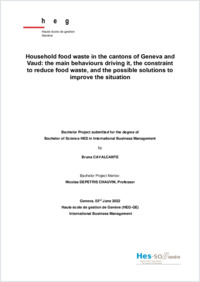Household food waste in the cantons of Geneva and Vaud : the main behaviours driving it, the constraint to reduce food waste, and the possible solutions to improve the situation
SONAR|HES-SO
- Cavalcante, Bruna
- Depetris Chauvin, Nicolas (Degree supervisor)
- Genève : Haute école de gestion de Genève
43 p.
Bachelor of Science HES in International Business Management: Haute école de gestion de Genève, 2022
English
Food waste is one of the major issues our society faces today. It is estimated that one-third of the food produced globally goes to waste. It has social, economic, and environmental impacts. There are 800 million people undernourished in the world, but if we stop wasting food we could have four times the food needed to feed all of them. Every year food waste costs approximately 1 trillion USD globally. And it is one of the major contributors to global warming. Food is wasted in every step of its journey and households are the main contributors. In Switzerland, almost 3 tons of food are wasted every year. Swiss households are responsible for 90 kilos per person a year and contribute to 38% of the impact that avoidable food waste have on the environment. This paper studies the main household behaviours driving food waste in the cantons of Geneva and Vaud. As well as the main constraints preventing them to reduce it. It also investigates what are the actions they are already taking to avoid food waste, and the knowledge they have on the subject. The collection of the data was done via an online survey that was conducted with 540 households from Geneva and Vaud, using the survey tool Qualtrics. The questionnaire on food waste tackled the specific topics of food labels, expiration dates, grocery shopping planning, leftovers, food conservation, uncalibrated fruits and vegetables, knowledge of food waste players, environmental impact, the main reasons food is wasted, and the actions households are taking to avoid food waste. The study concluded that citizens from the cantons of Geneva and Vaud are doing great efforts to avoid food waste, although there is a lot of room to improve. Nevertheless, the data shows that the main household behaviour driving food waste is lack of planning. Also, the main constraint preventing them from reducing food waste is the lack of knowledge on how to properly optimise the conservation of their food. Finally, the paper put forward a recommendation to add sustainability courses to the curriculum of the school, at a young age. The children of today will be the actors of tomorrow, thus they need to be well prepared for the challenge. On the Sustainability subject, it should be covered thematic like food waste, climate change, clean water, wildlife, oceans, forests, and all topics where attention is needed to save our planet. Consequently, in the food waste chapter, students would learn how to properly plan their food shopping and correctly store their food, among others. This is a long-term investment, but that could be already implemented.
- Language
-
- English
- Classification
- Economics
- Notes
-
- Haute école de gestion de Genève
- International Business Management
- hesso:hegge
- Persistent URL
- https://folia.unifr.ch/global/documents/321049
Statistics
Document views: 67
File downloads:
- BT - Report Document - Bruna CAVALCANTE.pdf: 248
